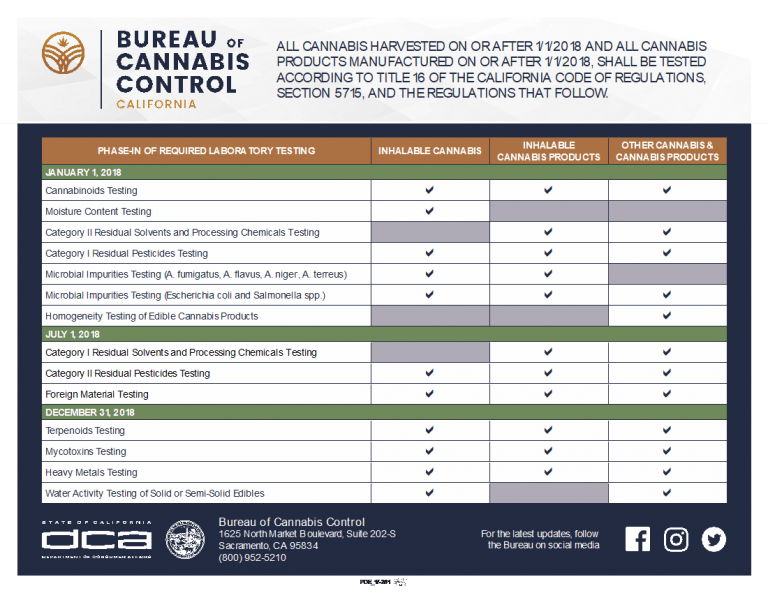What Are You Smoking?
- GreenCP

- Sep 6, 2018
- 4 min read

Bygone are the days of mystery marijuana, at least in California’s legal and regulated market. Today, when you step into a State-licensed dispensary, many of the products are likely to be cleaner than much of the fruits and veggies found in the produce isle at Trader Joe’s. The Medicinal and Adult-Use Cannabis Regulation and Safety Act (“MAUCRSA”) mandates laboratory testing for all cannabis flower and cannabis derivative products. And although cannabis enterprises may be “vertically integrated” – having cultivation, manufacture, and retail licenses and operations – the law requires that a lab licensee be completely independent from other types of cannabis licenses. This break in the chain, MAUCRSA § 26053(b), may attest to the legitimacy of the regulated cannabis industry in California more than any other single provision, and a licensee who attempts to circumvent the rigid testing process will almost certainly be caught and closed (State Track & Trace software makes it practically impossible, but that’s another article).
Type 8 Testing Laboratory facilities are governed by the Bureau of Cannabis Control (“BCC”), which is a sub-agency of the California Department of Consumer Affairs. To receive a Type 8 License to operate a testing laboratory, the applicant must obtain and maintain ISO/IEC 17025 accreditation (BPC § 26100(g)). This standard is no joke – the ISO/IEC is a joint technical committee comprised of the International Organization for Standardization and the International Electrotechnical Commission. To become accredited, the applicant must demonstrate competence, proper calibration, and quality management. In practical terms, this requirement means high-end equipment and qualified personnel, neither of which is inexpensive. All cannabis products must pass through one of these laboratories, and receive affirmation, prior to being on the shelf of any licensed retailer (regardless of medical or recreational designation). Cannabis Connoisseurs are excited to see the standardized cannabinoid content of all shelved products, but the testing process is much more involved. As of January 1, 2018, all cannabis and cannabis products are tested for cannabinoids, moisture, residual solvents, impurities and homogeneity. And the testing will only become more rigorous – the BCC has introduced a phased process for implementing testing requirements. The phased requirements are below (16 CCR § 5715):

For operators and prospective licensees, the laboratory testing requirements have real market implications. With continuous research on cannabis compounds and developments like “entourage effects”, customers are beginning to shop cannabis products with an eye for detail. Whereas cannabis consumers once focused solely on THC content, many products now offer detailed cannabis compound profiles. Dosist, for example, is a company producing disposable vape pens that feature chemical profiles that foster desired effects. The company has been celebrated for its standardized doses and extensive terpene catalogues found right on the packaging. The “Calm” pen profile below:

Dosist was voted one of Time Magazine’s Top 25 Inventions of 2016 and was named on Fast Company’s Most Innovative Companies of 2018 list. Although terpene content isn’t required until December 2018, the company is ahead of the curve. For companies that want to provide robust terpene profiles, there is a catch: if a producer orders testing for extensive analytes, and the batch does not meet specifications, then the batch will fail testing and is prohibited from moving on to a retailer. This is a strategic issue for producers operating throughout 2018; there is clear marketing value to adding extensive terpene profiles for products, but there is an inherent unnecessary risk in doing so, at least prior to 2019.
Generally speaking, as the regulations continue to unfold in California’s legal market, consumers’ expectations will increase concurrently. This upward trend on the “consumer sophistication” graph will likely continue through 2022, as State Law mandates that the Department of Food and Agriculture develop “Organic” certifications and “Appellation of Origin” standards by January 1, 2021 (BPC §§ 26062-63). In the meantime, consumers can be confident that product sold at licensed retailers is safe, clean, and produced under professional conditions, and that consuming black-market cannabis may entail smoking pesticides, residual solvents, and mold.

On July 1, 2018 the Bureau of Cannabis Control tightened up their testing requirements for commercial cannabis products. Any consumer who has visited their local commercial cannabis dispensary in the last month has seen how these regulations have played out on product quantities in dispensaries. Many dispensaries are scrambling to fill their shelves because 1 out of 5 products are not passing the new state testing requirements. To further the problem, there are only 31 testing labs in the state and all of them have become flooded with products requiring testing.
As a result of new testing regulations there have been 2 recalls since July 1, 2018. The Bloom Brand had to recall on a number of their pre-filled vape cartridges and disposable vape pens. The products were recalled due to containing a pesticide known as myclobutanil, which produces toxic fumes when heated. In fact, prior to the new testing requirements set in July 2018 it is thought that a lot of commercial cannabis contained myclobutanil. While these new testing requirements are sidelining certain producers and manufacturers, they will ultimately benefit the commercial cannabis consumer by only allowing clean products to hit the shelves.




Comments